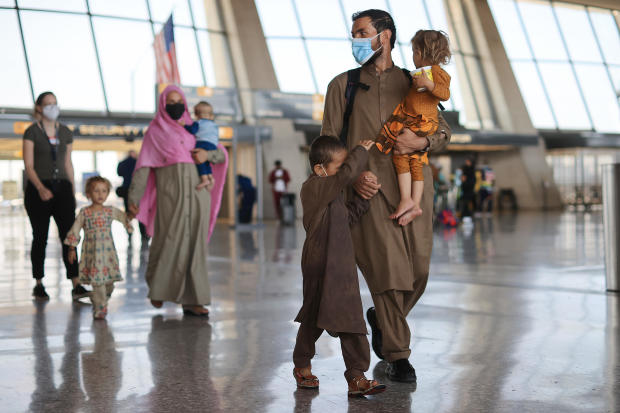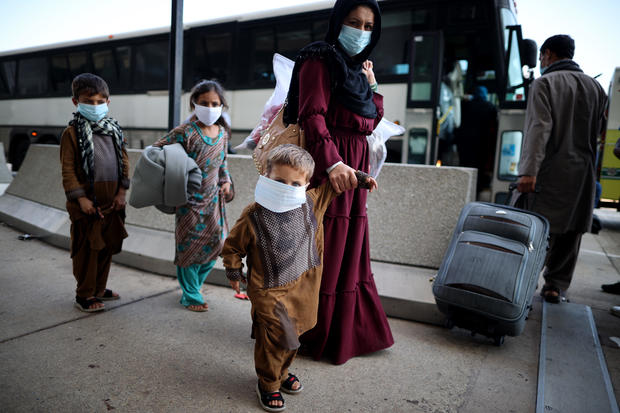US effort to resettle Afghan refugees faces major hurdles
The Biden administration's plan to resettle tens of thousands of Afghan refugees is facing formidable operational and legal challenges, with issues ranging from the uncertain immigration status of many evacuees, to limited social resources and permanent housing for the new arrivals.
Thousands of at-risk Afghans are arriving in the U.S. without approved visas, placing them in legal limbo and rendering them ineligible for some federal social programs available to those admitted as refugees, including cash assistance and Medicaid.
The sharp increase in admissions of Afghan evacuees over the past few days has also strained the resources of the nine national U.S. refugee resettlement agencies, prompting them to house some refugees in hotels and Airbnb rentals while affordable apartments are found, three resettlement officials told CBS News.
Since mid-August, the U.S. has admitted approximately 24,000 of the Afghans it evacuated from Kabul this summer ahead of the U.S. withdrawal. As of Thursday morning, more than 20,000 of them were being housed at eight military sites that have been chosen to temporarily host them, according to internal federal data reviewed by CBS News.
Another roughly 39,000 evacuees remained at military bases in Europe and the Middle East, including Afghans undergoing U.S. immigration processing and security vetting, the federal data showed.
The massive relocation operation, on a scale not seen since the U.S. evacuated tens of thousands of refugees from Vietnam in 1975, is testing the government's refugee resettlement system, which is not equipped to handle a sudden influx of evacuees. It has also prompted the resettlement agencies to stage a herculean effort to recruit volunteers and solicit donations.
"This is a very traumatized population that is coming from a crazy, chaotic evacuation system and is going to be put in a place where they are basically left to fend for themselves unless agencies are able to mobilize the private support to make it work," Erol Kekic, a senior vice president at Church World Service, one of the main resettlement agencies, told CBS News.
 Refugees arrive at Dulles International Airport after being evacuated from Kabul following the Taliban takeover of Afghanistan August 27, 2021, in Dulles, Virginia. Getty Images
Refugees arrive at Dulles International Airport after being evacuated from Kabul following the Taliban takeover of Afghanistan August 27, 2021, in Dulles, Virginia. Getty Images Some Afghans who assisted the U.S. war effort as translators and other roles are arriving with special immigrant visas (SIV), which allow them to become green card holders, or permanent residents, upon reaching the U.S. But many of the evacuees have pending SIV applications or lack immigration petitions, prompting U.S. officials to authorize their entry through a humanitarian tool known as parole.
The parole designation allows beneficiaries to stay and work in the U.S. temporarily, but it does not provide a direct pathway to permanent residency or access to certain federal programs designed to help newcomers integrate into American society, including Supplemental Security Income, food stamps, employment assistance and medical services.
To address these exclusions, the State Department is launching an "Afghan Parolee Support Program," which will help Afghan parolees with housing, transportation, food, cash, clothing, legal counsel and other services, according to multiple resettlement officials involved in the effort.
Resettlement agencies are expected to receive $2,275 for each Afghan parolee that they serve. However, parolees will only have access to the makeshift program for up to 90 days, so refugee advocates are now urging lawmakers to enact a legislative fix.
Congressmen Seth Moulton and Don Bacon, a bipartisan pair of former military officers, are planning to introduce a bill known as the WELCOME Act on Friday that would make Afghan parolees eligible for the same government benefits that traditional refugees receive, two congressional officials told CBS News.
The Office of Refugee Resettlement at the Department of Health and Human Services is also considering creating an ad hoc program to temporarily cover medical services for parolees, two resettlement officials said.
Parolees who don't qualify for the special immigrant visas will also need lawyers to secure other forms of permanent status, like asylum or family-based green cards, these officials said.
Those who were persecuted in Afghanistan or who fear persecution if returned there could potentially meet the legal threshold for asylum, but their cases could take years to be adjudicated, given a backlog of 403,000 pending applications before U.S. Citizenship and Immigration Services.
It is unclear what will happen to Afghans whose applications are rejected. While they would technically be subject to deportation, U.S. Immigration and Customs Enforcement (ICE) has not carried out a deportation flight to Afghanistan since late 2020, an agency official told CBS News.
"Our asylum process does not exactly have extra capacity for tens of thousands of new asylum requests," said Matthew Soerens, the director of church mobilization at World Relief, one of the national resettlement agencies. "And what do you do with someone who was paroled in from Afghanistan who isn't able to put together the evidence to prove they qualify for asylum? Is that person going to be sent back to the Taliban?"
To avoid this scenario, and to bypass the backlogged asylum pipeline, advocates are calling on Congress to establish a special legalization program for Afghan evacuees. Such a program, advocates said, could resemble the Cuban Adjustment Act of 1966, which allows immigrants from Cuba who were legally admitted to apply for green cards after a year in the U.S.
A Biden administration official told CBS News there are "ongoing" conversations about long-term plans to ensure Afghan evacuees "have the type of status in the United States that would facilitate continued employment, continued presence (and) continued integration into their new American communities," including a legislative remedy.
 Refugees board buses that will take them to a processing center at Dulles International Airport after being evacuated from Kabul following the Taliban takeover of Afghanistan on August 27, 2021 in Dulles, Virginia. Getty Images
Refugees board buses that will take them to a processing center at Dulles International Airport after being evacuated from Kabul following the Taliban takeover of Afghanistan on August 27, 2021 in Dulles, Virginia. Getty Images Most Afghans relocated to the U.S. are being taken to eight military installations, where they are undergoing COVID-19 testing, vaccination, medical checks and additional immigration processing, including applications for work permits.
Afghan evacuees are being required to receive vaccines against measles, mumps, rubella, polio and the coronavirus within seven days of being granted parole, according to a Department of Homeland Security document obtained by CBS News. They are also required to undergo tuberculosis testing.
If they fail to comply with the requirements, which also include notifying U.S. authorities of address changes and providing them requested information, Afghans could be stripped of their parole and subjected to "detention and removal" from the U.S., according to the document.
Once they finish processing at the military sites, Afghan evacuees are being connected to the resettlement agencies, which are tasked with helping them find affordable housing and jobs. The agencies typically help cover refugees' rent for up to three months while they settle down.
Resettlement officials said they've encountered "enormous" difficulties trying to find permanent residences for evacuated Afghans, many of whom tend to relocate to communities with large Afghan populations â€" including northern California, the Dallas area and northern Virginia â€" that have limited affordable housing.
Coupled with the increasing pace of refugee admissions, the limited housing options have prompted the resettlement agencies to work with hotel chains to secure short-term lodging.
"If you get like 80 people a day, your chances of securing apartments for that many people are probably not very large," said Kekic, the Church World Service vice president.
Soerens, the World Relief official, said his group has also used hotels to house some of the more than 360 Afghan special immigrant visa holders it received in August, including those with large families.
"We're used to getting a few weeks' notice about refugee arrivals and then we set up a team of volunteers who can get the apartments set up. Right now, we're sometimes getting a few hours notice," Soerens added.

0 Response to "US effort to resettle Afghan refugees faces major hurdles"
Post a Comment